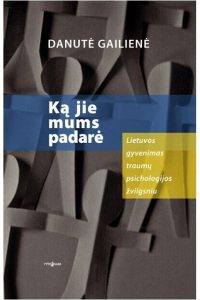Danutė Gailienė. WHAT HAVE THEY DONE TO US: THE LIFE OF LITHUANIA FROM THE PERSPECTIVE OF TRAUMA PSYCHOLOGY

HISTORY AND PSYCHOLOGY
Danutė Gailienė, What Have They Done to Us: The Life of Lithuania from the Perspective of Trauma Psychology (Ką jie mums padarė: Lietuvos gyvenimas traumų psichologijos žvilgsniu), Vilnius: Tyto alba, 2021, 246 pp.
The second edition of Danutė Gailienė’s monograph “Ką jie mums padarė” (What have they done to us, first published in 2008) has been published in 2021 as a response to high demand from the readership born during the Sąjūdis years and at the beginning of Independence (1990). This is the first generation of free independent Lithuanians, who seek to rethink their own history and identity, to comprehend their parents’ and grandparents’ generations, all of their behaviours and lived experiences while facing brutal turning points in history. Written from a professional point of view, using subject-specific vocabulary, but nonetheless in a lucid style, this book discusses psychological trauma, its consequences and manifestations, and presents the history of the research into trauma psychology, as well as looking back at the specific historical traumas conditioned by World War II – Holocaust, Soviet and Nazi occupations, repressions, mass-deportations. Discussing the topics of acknowledging and overcoming trauma, Gailienė persuades us that conformation to a totalitarian regime does much greater psychological harm than the endured repressions themselves. The title of the book suggests that we are not yet aware of the answer to the question what have they done to us? – we are yet to grasp and reflect fully on the fifty years of the Soviet era, the effects and consequences of this criminal totalitarian system, which continue to have an impact upon our present. That is why this book invites us to a dialogue about historical memory and experience.
Danutė Gailienė – psychologist, habilitated doctor of Social Sciences, and professor at the University of Vilnius. Her research focuses on clinical psychology, the psychology of trauma and crisis, and suicidology. Her monograph “Jie neturėjo mirti. Savižudybės Lietuvoje” (They were not supposed to die. Suicide in Lithuania, 1998) has drawn the society’s attention to the field of research into suicide and psychological pain. Gailienė is a pioneer of suicide prevention in Lithuania and has been awarded numerous prizes and grants for her research, including the Knight’s Cross of the “Order for Merits to Lithuania”.
Contact for rights: auguste@tytoalba.lt